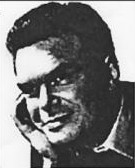Walter Andreas Schwarz
hideThis article has multiple issues. Please help or discuss these issues on the talk page. (Learn how and when to remove these template messages)
|
Walter Andreas Schwarz | |
|---|---|
 Promotional picture for the Eurovision Song Contest 1956 | |
| Background information | |
| Born | 2 June 1913 Aschersleben, German Empire |
| Died | 1 April 1992 (aged 78) Heidelberg, Germany |
| Genres | Chanson, Schlager |
| Occupation(s) | Singer, songwriter |
| Years active | 1956–1992 |
| Labels | Ariola |
Walter Andreas Schwarz (2 June 1913 – 1 April 1992) was a German singer, songwriter, novelist, Kabarettist, author of radio dramas and translator.
Biography[]
Schwarz was born in Aschersleben. In 1938, Schwarz was deported along with his family to a concentration camp in Holzen because he and his family were German Jews. He remained at the camp until the end of World War II. Both of Schwarz's parents died, while he claims that he only survived because the camp's commander was a former childhood friend.[1]
In 1956, he competed with his own composition Im Wartesaal zum großen Glück in the German national final for the Eurovision Song Contest and won. Along with Freddy Quinn, he therefore became the first German entrant in the competition. His placing is not known, but it is rumoured that he finished second.[2] The song was released as a single but commercially, it was not very successful. Other notable records were not released. He went on to become a successful author of novels and especially radio dramas. One of his last contributions was an adaption of The Hitchhiker's Guide to the Galaxy in 1990 and 1991, which included 17 episodes. In 1985, he appeared – along with many other former German representatives – in the interval act of the German national final, which was a medley of all German entries until that year. For many years, he lived in London before he moved back to Germany. He died on 1 April 1992 in Heidelberg.
Works[]
Novels[]
- Die Frucht der Ungesetzlichkeit (1982)
- Der Bürger Karl Marx aus Trier (1983)
Radio dramas[]
- Der Untertan (1965)
- Anna Karenina (1967)
- Don Quijote (1964)
- Jud Süß (1986)
- The Hitchhiker's Guide to the Galaxy (1990–1991)
Sources[]
- Jan Feddersen: Ein Lied kann eine Brücke sein, Hoffmann und Campe 2002
References[]
- ^ Walter Andreas Schwarz: Der Aschersleber Künstler war Sänger und Schauspieler Mitteldeutsche Zeitung, 2. Juni 2010 [1] abgerufen am 30. September 2019
- ^ OGAE Germany – Der Fanclub zum Eurovision Song Contest
External links[]
- Walter Andreas Schwarz at IMDb
- 1913 births
- 1992 deaths
- 20th-century German male writers
- 20th-century German novelists
- 20th-century German singers
- 20th-century male singers
- Eurovision Song Contest entrants for Germany
- Eurovision Song Contest entrants of 1956
- 19th-century German Jews
- German expatriates in England
- German male musicians
- German male singers
- German male novelists
- Jewish concentration camp survivors
- People from Aschersleben